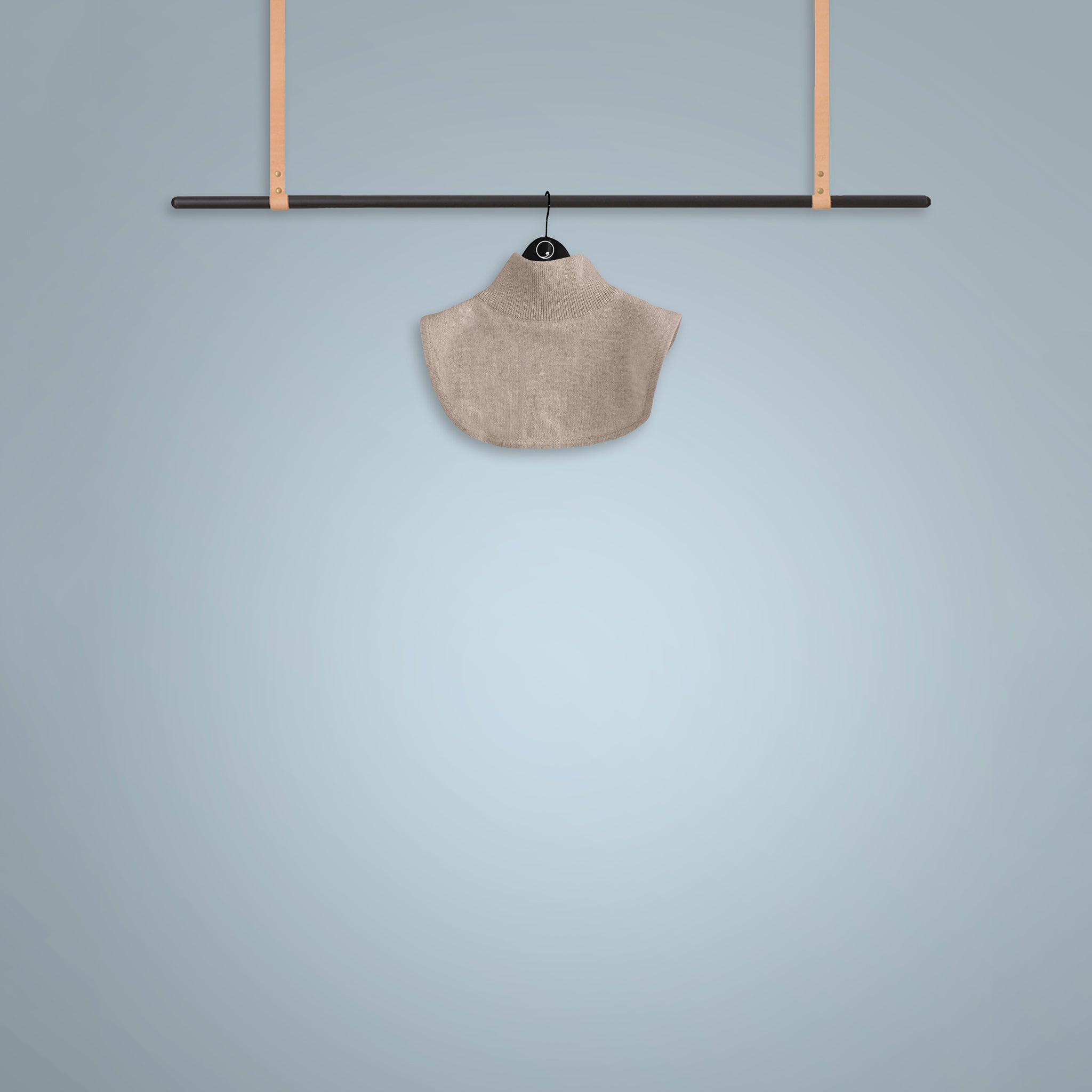-
Balsa, our 100% natural hand-harvested cashmere neck warmer
-
12 gg jersey knit shown in cream colour
-
Ayo is wearing 1-2 Y
-
Balsa, our 100% natural hand-harvested cashmere neck warmer
-
12 gg jersey knit shown in cream colour
-
Ayo is wearing 1-2 Y
We offer Free shipping in Norway
*See terms and condition here.

When you invest in high-quality woollen apparel, you are not only lowering the cost per wear but you are also investing in the most comfortable products that will stay true to you as long as you treat them right. It's not easy memorising all the things that will prolong the relationship you have with your soft woollen garment, so we've compiled a handy checklist that should keep your woollens looking fresh for a long time.
WEARINGDon't wear the same woollen garment too frequently. Allow it a two or three days rest after a day of wearing.
You should be mindful of what you wear your cashmere with. A knitted woollen garment next to rough clothing, metal necklaces, bracelets, belts and rough leather items such as crocodile leather bags is a recipe for pilling and snagging. PILLING
Our wool is natural and organic and has not undergone treatments to enhance its features. Pilling is a natural inherent characteristic of wool. Use a cashmere comb to remove the fuzz balls and your garment is as good as new.
STORING
If your chosen storage place is a shelf or drawer, line it with fragranced anti-moth paper. If it's a wardrobe, invest in some cedar balls or scented sachets.
We do not recommend that you hang your woollens in your wardrobe. They will lose their shape and start sagging. Always fold them when storing.
Do not use cardboard boxes to store your woollens in - they are not pH neutral so the chemicals in the fabric could react with the acid or alkaline in the boxes (brown cardboard boxes are very alkaline).
Don't leave garments in plastic bags for more than three months because of the change in temperature - central heating going on and off causes condensation in the bags, which dries on the garments and can cause mildew or yellowing on light colours.
When the garment is not in use, store them in dust bags, or sealable garment containers to protect them from moths. As a general rule, any stored clothes need to be kept well-aired, dust free and covered, away from sunlight. Nothing should be left in direct sunlight as sunlight rots fabrics.
MOTHS AND REMEDIES
If you have discovered moth in your woollens, then it is recommended that you have moth traps in every room. It's a sticky pheromone trap that will kill all male moths and leave females with no eggs to lay.
You can also freeze your woollens by simply putting it in a ziplock bag and freeze it overnight. This procedure should kill any moth and moth larvae. Remember to give your garment a good shake out afterwards. This will ensure that all unwanted species occupying your coveted woollen garment to vacate the premises.
The lifecycle of a moth egg is 21 days, so it's a good idea to air your woollen briefly in daylight as moth and moth larvae are repelled by this, and will drop off your clothing if there are any.
WASH ICONS YOU SHOULD KNOW ABOUT

DO NOT BLEACH your woollen sweater.

DO NOT TUMBLE DRY your woollen sweater.

DRY CLEAN
If you do not know how to wash delicate woollen clothing, we strongly advise you to use your local green dry cleaners. Alternatively, for more information on how to wash your woollens, read on.

HAND WASH 30 DEGREES
Hand washing is always the safest method to wash your delicate woollens. Here is what you do:
- Add a delicate washing detergent into a wash basin. Use liquid detergent specifically for wool wash.
- Submerge your garment in a washbasin containing detergent and water that is not warmer than 30 Celcius degrees, and leave your woollen garment to soak 10 minutes without stretching the garment.
- Remove as much excess water from the jumper by rolling it into a ball and gently pressing – never wring out wool because the material could easily be stretched out of shape.
- Replace the soapy water with fresh, clean water and place the jumper into the tub to rinse. Swish in the same way you did when washing the jumper.
- Repeat the rinsing process with clean water as many times as needed to remove all traces of laundry detergent.

DO NOT WRING YOUR SWEATER
Once you have completed the washing steps, you will need to get all excess water out of the garment. Use a towel, lay it flat and place the garment flat on the dry towel. Roll the towel with the garment inside the towel until you are left with a roll looking like a sausage.

Once you have completed the towel rolling step, lay the garment flat to dry on your drying rack. Do not hang the garment to dry on a hanger or a drying rack.
Keep your sweater away from heat sources like radiators/heaters and sunlight, allowing it to air-dry naturally.

Wool jumpers can safely be washed in the washing machine using delicate liquid detergents and machine settings that are designed to mimic the gentle actions of traditional hand washing. Set the washing machine to the hand wash cycle, or wool cycle. Your machine will automatically wash at cooler temperatures and will spin much slower to reduce the risk of damage to the material. The temperature should be cool (30 degrees) and the cycle short - no longer than 30 minutes.
So if you have one of these modern washing machines, go for it!
Wool fibre has many brilliant natural properties; dirt and grease can easily be shaken off the garment. Wool, in general, prevents bacteria from living in sweat, thereby naturally reducing unpleasant odours. Thus, there is no need to wash your wool garments as often as garments made of synthetic materials or cotton. Avoid washing your woollens too often as this can easily lead to brittle wool fibres, causing the yarn to break.
WHAT TO DO WHEN YOU'VE ACCIDENTALLY SHRUNK YOUR SWEATER?
If you’ve accidentally shrunk your favourite wool sweater, and depending on the type of rough treatment the sweater may have been through, you may be able to save it from the charity bag by gently ‘unshrinking’ it.
- Submerge the sweater into a washbasin with some water.
- Massage a bottle of hair conditioner the sweater.
- Let it soak for minimum 10 minutes.
- Carefully stretch the sweater while it is submerged in the washbasin.
- Rinse the sweater until the water is clear.
- Lay the sweater flat on some bath towels and carefully stretch the material, securing the edges with sewing pins, then leave to dry.
This method of ‘unshrinking’ should only be used as a last resort – there is a risk of damage, and it may not be possible to get the jumper looking exactly the same as it did before.
The best of luck!!
Click here for further handwashing information.
























































